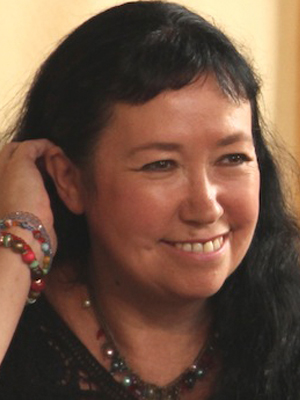Q&A with award winning poet Pascale Petit
Pascale Petit has published five poetry collections, three have been shortlisted for the TS Eliot Prize, and has featured in Books of the Year in the Observer, Times Literary Supplement and Independent. She also runs special poetry workshops in museums and galleries, using art to reflect on how to give shape to poems and make images with words. She has worked on a special publication with artist Lawand produced especially for his upcoming exhibition Equinox, From Beirut to London.

Q1/ You have just collaborated with the artist Lawand to produce a new publication which is directly inspired by the works included in his upcoming exhibition LAWAND: Equinox, From Beirut to London. Can you tell us more about this project?
The Mosaic Rooms invited me to write poems in response to thirty-four of Lawand’s new drawings, to be printed alongside them in a publication for the exhibition. I had never seen his work before and was stunned by the power of his figures, emerging from mist, so ethereal and wounded, yet bathed in hard-won light. I knew at once that it would be an exciting challenge to write them.
I wrote fifteen in all, while I was in Paris this summer. Each day I got up very early and immersed myself in his art – the paintings full-screen on my laptop, copies of the drawings pinned on the walls. My desk was at a window that opened onto a courtyard with vine-covered walls. Wood pigeons had nested there and I witnessed the first flights of both chicks. This fed into my poems, as some of Lawand’s figures seem to be attempting flight.
Although I drew on my personal family history to make my figure-poems, I wanted to make them everyman/woman as well, which I understand to be Lawand’s aim. In the background there is the shadow of the terrible situation in his homeland Syria, though like him I did not address this overtly.
Q2/ You often use artwork as an inspiration for your poetry, can you tell us more about this practise?
My last book What the Water Gave Me: Poems after Frida Kahlo was a collection written in the voice of the Mexican artist, where each poem has the title of one of her paintings. What I was interested in was the way she made art out of pain. That was my way in, the transformation of pain to paint. She was seriously injured in a bus crash when she was a teenager and was disabled for the rest of her life, but she wasn’t a sad character, she was full of joie-de-vivre.
I trained as a visual artist and spent the first part of my life as a sculptor. When I decided to concentrate on poetry I still needed to make my poems as visceral as my sculptures; I try to make poems that are physical as objects, installations or paintings. Images are paramount, and artists influence my work – Lawand is a new influence. I also tutor poetry workshops in galleries and have taught at Tate Modern for seven years. I’ll be doing a workshop in the Lawand exhibition (Poetry from Art: Writing The Body), which I’m very much looking forward to. I can’t wait to see what everyone writes when they see those amazing paintings!
Q3/What are you working on right now?
My sixth collection Fauverie. It’s based in Paris where I was born. It’s where I spent the first seven years of my life and where I met my estranged father before he died of emphysema. The ‘fauverie’ is both his tiny room where he was confined to oxygen and the Fauverie – the big-cat house – in the Ménagerie of the Jardin des Plantes, which I am obsessed with. There’s a black jaguar there, Aramis, who to me epitomises the Amazon, where I have travelled.
Pascale Petit will lead a special one day poetry workshop entitled ‘Poetry From Art: Writing the Body’ on Monday 14 October, 11am-5pm. This one-day workshop will introduce participants to different poetic responses to contemporary art using our current exhibition for inspiration. BOOK NOW